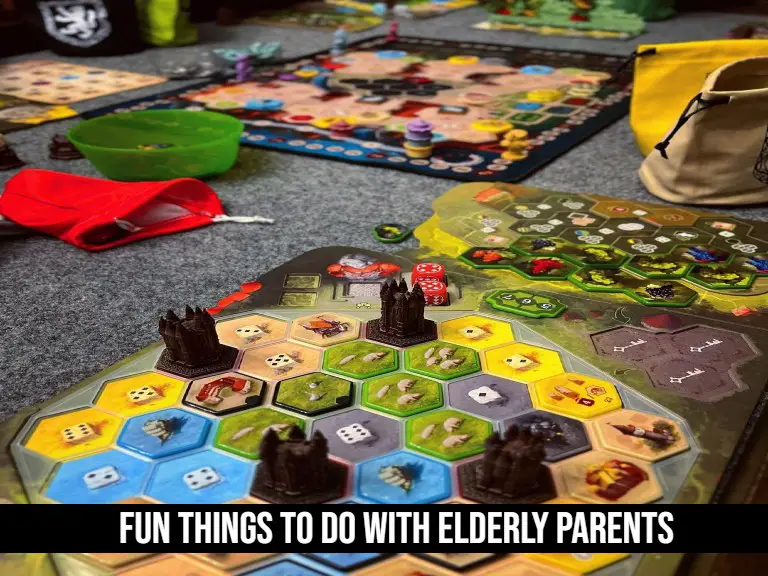
Spending quality time with our elderly parents is an overlooked treasure. But who says growing old has to be dull? From reliving cherished memories to creating new ones, a world of joy is waiting to be explored with our aging loved ones.
Whether it’s a leisurely walk in the park, a nostalgic movie night, or even a thrilling art class, the possibilities are endless and filled with laughter.
Dive into our unique and creative list of activities that promise fun and a bonding experience that you and your elderly parents will cherish forever.
15 Fun And Engaging Things to Do With Elderly Parents
Activities for Elderly Parents with Limited Mobility
Engaging elderly parents with limited mobility in activities is important to promote mental stimulation and enhance their overall well-being. According to American Psychological Association research, the proportion of older persons who require assistance with daily activities increases with age. Here are some activities that can be enjoyed together:
1. Engaging in Board Games and Puzzles
Engaging in board games like Scrabble, Chess, and Bingo can be a delightful way for elderly parents with limited mobility to stimulate their minds. These games not only provide entertainment but also enhance cognitive functions.
- Scrabble: A word game that challenges vocabulary and spelling skills.
- Chess: A strategic game that sharpens logical thinking.
- Bingo: A fun game that can be played with a larger group, promoting social interaction.
Tip: Choose games that align with their interests and cognitive abilities to ensure an enjoyable experience.
2. Shared Reading Experiences
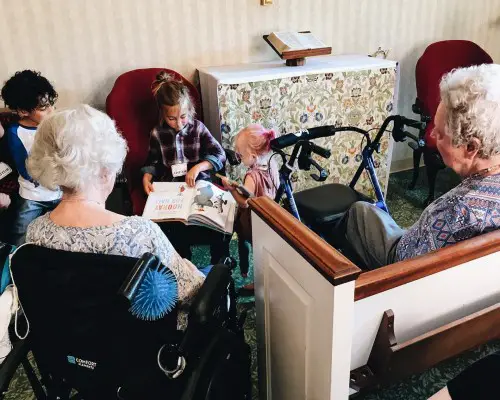
Shared reading experiences can be a wonderful way to connect with elderly parents. Whether it’s reading aloud to them or discussing a book you’ve both read, this activity can spark meaningful conversations.
- Choose Accessible Books: Select books that are engaging and suitable for their reading level.
- Create a Reading Schedule: Plan weekly discussions to keep the momentum going.
Note: Audiobooks can be a great alternative for those with visual impairments.
3. Pampering and Personal Care
Pampering activities like massages, manicures, and pedicures can provide relaxation and a sense of well-being. These personal care activities can be done at home with the right tools and products.
- Massages: Gentle massages can ease muscle tension.
- Manicures & Pedicures: Keeping nails groomed adds to personal hygiene and aesthetics.
Tip: Ensure that the products used are suitable for sensitive skin.
4. Movie and TV Show Time
Movies and TV shows can be a source of entertainment and education. Documentaries can provide insights into various subjects, while cooking shows can inspire culinary creativity.
- Documentaries: Choose topics that pique their interest.
- Cooking Shows: Engage them in trying out new recipes.
Note: Consider their preferences and avoid content that may be too intense or inappropriate.
5. Baking and Cooking Together
Baking and cooking together can be a joyful and rewarding activity. Whether it’s for special occasions or exploring new recipes, this hands-on experience can be adapted to their mobility levels.
- Special Occasions: Celebrate birthdays or anniversaries with homemade treats.
- New Recipes: Experiment with recipes that are both nutritious and delicious.
Tip: Ensure safety by using ergonomic kitchen tools and providing necessary assistance.
Overall, these activities offer diverse and enriching experiences for elderly parents with limited mobility. Tailoring them to individual needs and preferences can enhance their quality of life and strengthen familial bonds.
Outdoor Activities for Active Seniors
Staying active and enjoying the outdoors is important for seniors to maintain a healthy and fulfilling lifestyle. Engaging in outdoor activities not only provides physical exercise but also offers opportunities for social interaction and mental stimulation.
According to a 2014 study, 28% of persons aged 50 and up who were surveyed reported no physical activity aside from their normal employment in the previous month. Here are some ideas for outdoor activities that are suitable for active seniors:
1. Gardening and Nature Walks
Gardening in community gardens or strolling through local parks can be a therapeutic and fulfilling experience for active seniors.
- Community Gardens: Planting and nurturing flowers and vegetables can provide a sense of accomplishment and connection to nature.
- Nature Walks: Exploring walking trails in local parks can be a gentle way to exercise and enjoy the outdoors.
Tip: Consider accessibility and safety when choosing locations, and encourage participation in community garden projects.
2. Picnics and Bird Watching

Picnics and bird watching offer opportunities for family bonding and nature exploration.
- Picnics: Organizing family picnics in scenic locations can create lasting memories.
- Bird Watching: Observing and identifying birds can be a fascinating hobby that connects seniors with nature.
Note: Bring along binoculars and bird guides to enhance the bird-watching experience.
3. Seasonal Activities
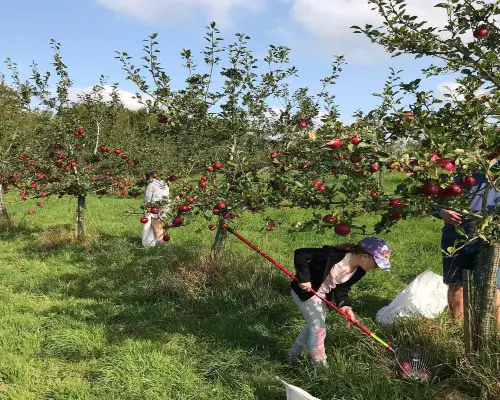
Seasonal activities like orchard picking and visiting farmer’s markets can be delightful ways to enjoy fresh produce and local culture.
- Orchard Picking: Picking fruits like apples or berries can be a fun and rewarding experience.
- Farmer’s Markets: Exploring local farmer’s markets offers a taste of fresh, seasonal produce and supports local farmers.
Tip: Check the accessibility and availability of seasonal activities in your area.
4. Recreational Sports and Fishing

Recreational sports and fishing provide active seniors with enjoyable ways to stay physically engaged.
- Mini Golf: A light-hearted game that offers fun competition.
- Boating: Exploring lakes or rivers by boat can be a serene experience.
- Fishing: A relaxing hobby that connects with nature and can be enjoyed alone or with friends.
Note: Ensure that activities are suited to individual fitness levels and preferences.
5. Art Appreciation
Art appreciation activities like visiting sculpture gardens or taking art tours can enrich the minds and souls of active seniors.
- Sculpture Gardens: Wandering through gardens adorned with sculptures can be a visually stunning experience.
- Art Tours: Guided tours of art galleries or historical sites offer insights into art and culture.
Tip: Look for senior-friendly tours and venues that cater to specific interests.
Active seniors can take part in these outdoor activities to become physically fit, learn about culture, and be connected to nature and their families. Creating meaningful and enjoyable experiences can be accomplished by tailoring them to each individual’s interests and abilities.
Indoor Activities for Creative Engagement
Indoor activities provide a diverse range of opportunities for creative engagement, personal growth, and enjoyment. Whether it’s nurturing a garden, crafting, exploring music, or engaging in games, these activities can be tailored to individual interests, offering fulfilling and enriching experiences.
1. Gardening and Cooking Indoors
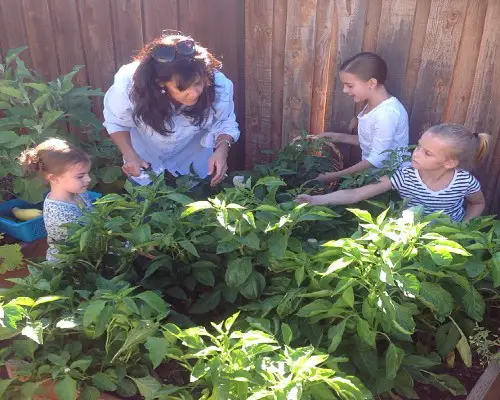
Indoor gardening and cooking provide creative outlets that can be both relaxing and rewarding.
- Herb Gardens: Growing herbs indoors adds freshness to cooking and a touch of greenery to the home.
- New Dishes: Experimenting with new recipes can be a delightful culinary adventure.
Tip: Consider using fresh herbs from the indoor garden in cooking to create farm-to-table dishes.
2. Crafting and Memory Keeping
Crafting activities like quilting and scrapbooking allow for personal expression and memory preservation.
- Quilting: Creating quilts can be a therapeutic hobby that results in beautiful, functional art.
- Scrapbooking: Preserving memories through scrapbooking can be a sentimental journey.
Note: Crafting can be a social activity; consider crafting groups or online forums.
3. Music, Photography, and Pets
Music, photography, and pet care offer diverse ways to engage creatively and emotionally.
- Learning Instruments: Picking up a musical instrument can be a fulfilling challenge.
- Photography: Exploring photography can be a creative way to capture moments.
- Pet Care: Caring for pets provides companionship and routine.
Tip: Online tutorials and classes can support learning new skills in music and photography.
4. Online Games and Family History
Online games and exploring family history can be intellectually stimulating and personally meaningful.
- Chess and Word Puzzles: Engaging in online games can sharpen the mind.
- Family Trees: Researching family history can create a connection to one’s heritage.
Note: Online platforms offer various resources for genealogy research and gaming.
5. Wellness and Mindfulness Practices
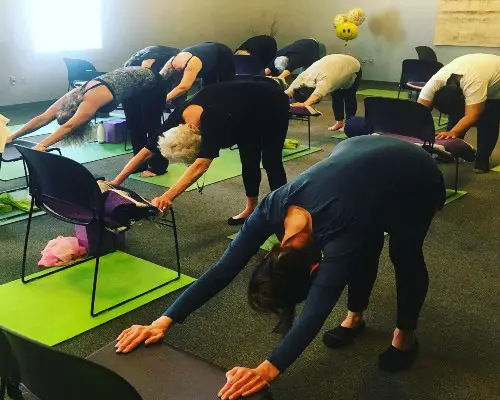
Wellness and mindfulness practices like yoga, meditation, and journaling can enhance mental and physical well-being.
- Yoga: Gentle yoga practices can improve flexibility and reduce stress.
- Meditation: Regular meditation can foster a sense of inner peace and clarity.
- Journaling: Writing in a journal can be a reflective and therapeutic practice.
Tip: Consider guided sessions or apps that offer support in these practices.
It is clear that indoor activities for creative engagement offer a wide range of options that cater to diverse interests and needs. From nurturing creativity to enhancing well-being, these activities provide avenues for growth, connection, and fulfillment.
How can I make activities more enjoyable and engaging for elderly parents?
To enhance the enjoyment and engagement of elderly parents, consider the following tips:
1. Take their preferences and limitations into account when choosing activities.
2. Allow them to participate at their own pace and provide breaks when needed.
3. Create a comfortable and safe environment by ensuring proper seating, lighting, and temperature.
4. Incorporate sensory stimulation, such as playing their favorite music or using scented candles.
5. Encourage social interaction by involving other family members or friends in the activities.
6. Provide opportunities for them to reminisce and share stories, fostering emotional connections.
7. Adapt activities to their abilities, using modified equipment or simplified rules if necessary.
8. Celebrate small achievements and offer encouragement and praise throughout the activities.
9. Ensure that the activities are varied and offer a mix of mental, physical, and emotional stimulation.
10. Be patient, understanding, and flexible, as each individual may have different preferences and needs.
Ensuring Safety and Well-being While Having Fun with Elderly Parents
Participating in fun activities with elderly parents can be a joyful and rewarding experience. However, it requires careful planning and consideration to ensure their safety, comfort, and well-being. Below are some key aspects to consider:
1. Choosing Appropriate Activities
Selecting activities that align with your elderly parents’ physical abilities, cognitive levels, and personal interests is essential.
- Physical Considerations: Assess mobility, strength, and endurance to choose activities that are safe and enjoyable.
- Cognitive Considerations: Consider cognitive abilities when selecting games, puzzles, or other mentally stimulating activities.
- Personal Interests: Tailor activities to their hobbies and passions for a more engaging experience.
Tip: Regularly communicate with them to understand their preferences and any changes in their abilities.
2. Safety Precautions and Accessibility
Ensuring that the environment is safe and accessible minimizes risks and enhances enjoyment.
- Home Safety: Remove tripping hazards, provide proper lighting, and ensure that seating is comfortable and supportive.
- Outdoor Safety: If venturing outside, choose locations that are wheelchair accessible if needed, and consider weather conditions.
- Emergency Preparedness: Have a first aid kit handy and know the location of the nearest medical facility.
Note: Consider using adaptive equipment or tools designed for seniors to enhance safety and ease of use.
3. Social Interaction and Emotional Well-being
Social interaction and emotional connection are vital for the overall well-being of elderly parents.
- Family Gatherings: Plan regular family gatherings that are inclusive and considerate of their needs.
- Community Engagement: Encourage participation in community events or groups that align with their interests.
- Emotional Support: Be attentive to their emotional needs and provide encouragement and companionship.
Tip: Balance social activities with quiet, restful times to prevent fatigue or overwhelm.
4. Health Considerations and Nutrition
Consideration of dietary needs and overall health is essential when planning activities and meals.
- Dietary Preferences: Plan meals or snacks that align with their dietary restrictions or preferences.
- Medication Management: Be mindful of medication schedules and any specific requirements related to food or activities.
- Hydration: Ensure that they stay well-hydrated, especially during physical activities.
Note: Consult with healthcare providers if you have specific concerns about their health or dietary needs.
A thoughtful plan, empathy, and attention to their individual needs and preferences are necessary to ensure elderly parents’ safety and well-being while having fun. Your relationship with them can be strengthened by prioritizing these aspects and creating meaningful and enjoyable experiences for them.
FAQs
Q1: How can I involve my elderly parents in family gatherings and community events?
A: Engaging seniors in community and family events is easier when they understand their interests, mobility, and comfort levels. Plan inclusive events, provide support, and encourage participation in community groups. Balance social activities with restful times to prevent fatigue.
Q2: How can I find professional companion care services for my elderly parents?
A: Companion care professionals can be found at healthcare agencies, community centers, or online platforms. Provide personalized and compassionate care based on their specific needs, preferences, and values.
Conclusion
Activities that cater to the specific interests and needs of elderly parents can foster deeper connections. Adventures outdoors, creative indoor activities, safety measures, and emotional health are all options. Success lies in thoughtful planning, understanding abilities, and balancing stimulation and relaxation.
It’s not just about entertainment for elderly parents, but also about enriching their lives and strengthening their relationships. In order to enhance the quality of life of the elderly, it is important that individualized care and connection are provided.

